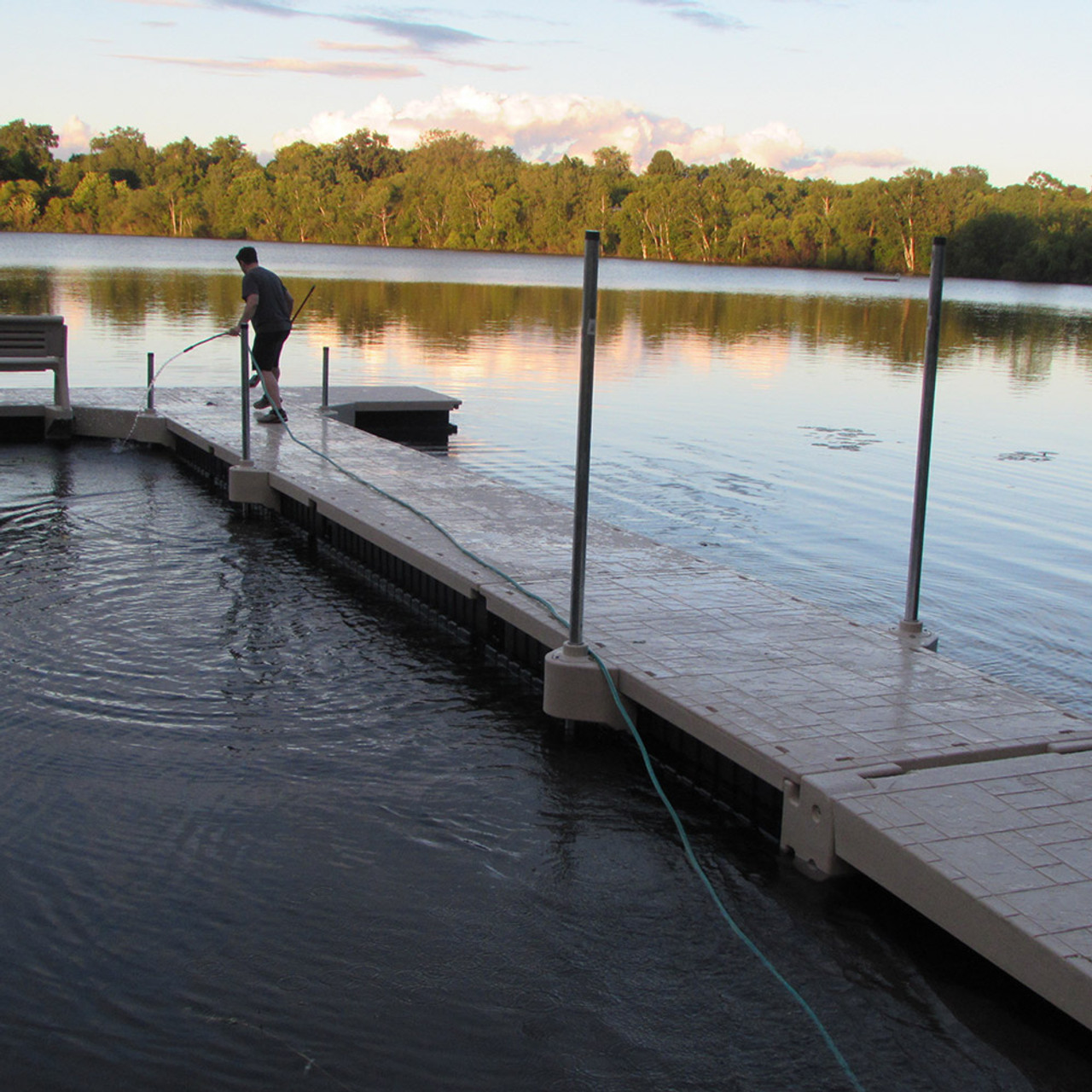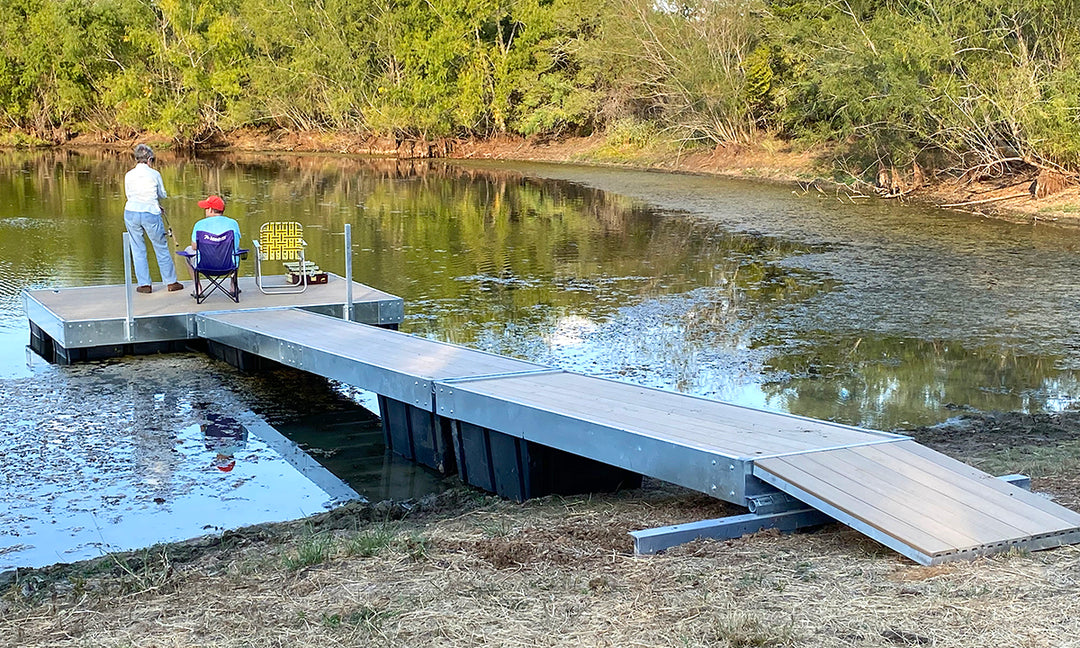Check Out the Advantages of Setting Up Floating Docks for Your Residential Or Commercial Property
The installation of floating docks presents a strategic opportunity for home proprietors looking for to enhance both performance and worth. As we check out the multifaceted benefits of floating docks, it comes to be apparent that their advantages expand far beyond plain comfort, potentially changing your building in means you might not have considered.
Boosted Availability for Water Activities
Floating docks regularly improve access for different water activities, making them an important addition to beachfront homes. These frameworks offer a stable platform for individuals to take part in a variety of marine quests, consisting of boating, kayaking, swimming, and fishing. By developing a marked area for these activities, floating docks help with ease of accessibility and boost safety, particularly for family members with kids or individuals with mobility obstacles.
The layout of floating docks permits them to drop and increase with water degrees, guaranteeing a consistent and easily accessible strategy to the water no matter conditions. This flexibility not just improves individual experience however likewise encourages even more frequent usage of waterside locations. Furthermore, floating docks can accommodate various setups, allowing residential property proprietors to personalize their arrangements to suit details demands, such as mooring multiple vessels or giving adequate angling space.
Additionally, the presence of a drifting dock can elevate the general allure of a home, drawing in potential buyers or tenants who value direct accessibility to entertainment tasks. In recap, the setup of floating docks considerably improves access, fostering a dynamic ambience for delighting in the natural beauty and entertainment opportunities that waterfront locations offer.
Adaptability to Transforming Water Degrees

Among the vital advantages of floating docks is their remarkable adaptability to changing water degrees. Unlike fixed docks, which can become submerged or exposed as water degrees fluctuate, floating docks preserve their position about the water surface area. This versatility permits them to fall and increase with tides, seasonal adjustments, and varying climate condition without losing capability.
As water levels boost, floating docks readjust effortlessly, supplying consistent accessibility for boats and boat. Conversely, throughout durations of dry spell or low tide, these docks continue to be obtainable, making sure that customers can securely browse to and from their vessels. floating docks. This adaptability is specifically useful in locations prone to significant water level variants, such as rivers, lakes, and seaside regions

Enhanced Home Value
Mounting floating docks can significantly improve building worth, especially for waterside properties. The visibility of a properly designed dock not Extra resources just offers as a practical space for boating, angling, or recreation, however it likewise raises the total visual allure of the home. This aesthetic improvement can make a property much more attractive to possible buyers, causing enhanced need and possibly higher sale prices.
Moreover, floating docks can raise the usability of beachfront areas, enabling better access to water tasks. This included capability can be a major marketing point, especially for people or households who prioritize outside recreation. In addition, residential properties with docking facilities often stick out in the property published here market, offering special attributes that differentiate them from comparable listings.
Additionally, the installation of floating docks might indicate investment in residential property renovations, showing a dedication to enhancing the worth and keeping of the home. This can impart confidence in purchasers pertaining to the general quality and treatment of the home - floating docks. Consequently, mounting floating docks is not simply an enhancement for individual enjoyment; it is likewise a tactical financial investment that can produce a substantial return in property worth with time.
Low Upkeep Requirements
The reduced maintenance demands of floating docks make them an attractive selection for homeowner seeking a hassle-free option for waterfront access. Unlike conventional fixed docks, floating docks are less vulnerable to damage from varying water levels and harsh weather. Their resilient layout minimizes damage, minimizing the regularity of essential repairs.
Furthermore, lots of floating docks are created from sturdy materials such as polyethylene or composite materials, which resist rot and corrosion. This sturdiness translates to lower long-lasting maintenance expenses and less time invested in upkeep. Routine upkeep mostly involves regular cleaning to eliminate algae and debris, ensuring the dock remains secure and useful.
Moreover, floating docks can be easily eliminated throughout off-seasons, securing them from severe weather and expanding their lifespan - floating you could try these out dock company. This versatility enables homeowner to adapt their beachfront accessibility according to seasonal modifications, with minimal effort needed
Versatile Layout Options
Floating docks not just provide reduced maintenance requirements yet also provide a series of versatile layout options that deal with numerous waterside requirements. This flexibility permits homeowner to personalize their docks according to certain preferences and useful requirements.
Among the crucial advantages of floating docks is their modular design. These docks can be conveniently broadened or reconfigured, making it possible for individuals to readjust their layout as requirements change gradually. Whether you call for additional room for boating, swimming, or recreational activities, modular systems supply the versatility to suit diverse uses.
Furthermore, floating docks can be crafted from various products, including timber, aluminum, and composite alternatives. Each material supplies special benefits, such as resilience, appearances, and resistance to deterioration, allowing homeowners to pick a service that straightens with their residential property's style and environmental problems.
Furthermore, floating docks can be boosted with a variety of accessories, such as lights, storage space services, and safety and security functions. This modification not just improves functionality however also elevates the overall aesthetic allure of your waterside building, making floating docks an excellent financial investment for a broad array of applications.
Final Thought
In final thought, the setup of floating docks deals numerous advantages for waterside buildings. Furthermore, low maintenance requirements and versatile design options additionally contribute to the charm of floating docks.
